Kennedy's Last Days: The Assassination That Defined a Generation (14 page)
Read Kennedy's Last Days: The Assassination That Defined a Generation Online
Authors: Bill O'Reilly
The ExComm group meets to discuss the situation in Cuba.
[JFK Presidential Library and Museum]
Bobby, who has listened quietly throughout the 70-minute meeting, finally speaks up, suggesting that a full-scale invasion of Cuba might be necessary. It is the only way to prevent Russian bombs from ever being placed on Cuban soil.
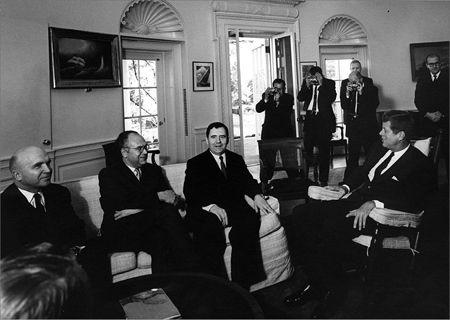
JFK, in his rocking chair, meets with Soviet foreign minister Andrei Gromyko, on Kennedy’s right, on October 18, 1962. The Soviet ambassador to the U.S. is on Gromyko’s right. White House Secret Service agent Frank Yeager stands behind the photographers.
[JFK Presidential Library and Museum]
Even as military force seems like the only solution, JFK is still troubled by the question of motive. Why is Nikita Khrushchev trying to provoke the Americans into war?
The president doesn’t know the answer. But two things are apparent: Those missiles must be removed and, far more important, those nuclear warheads cannot be allowed to reach Cuba.
Ever.
On October 18, Kennedy meets privately with Soviet foreign minister Andrei Gromyko. It is Gromyko who requests the meeting, not knowing that the Americans have discovered that the Soviets have placed offensive missiles in Cuba. The topics of discussion are the goings-on in Berlin and Soviet leader Khrushchev’s upcoming visit to America. Kennedy skillfully guides the subject toward the topic of nuclear weapons. Gromyko then lies to the president’s face, stating most adamantly that the Soviet Union would never become involved in the furnishing of
offensive
weapons to Cuba. He says that the Soviet advisers in Cuba are training the Cuban military to use
defensive
weapons.
Of course, Kennedy knows that Gromyko is lying.

An SS-4 missile, the kind the Soviets sent to Cuba.
[©
Shutterstock.com
]
CHAPTER THIRTEEN
OCTOBER 19 TO 25, 1962
The White House
T
HERE IS NO DAY AND THERE IS NO NIGHT
in the Kennedy White House as the Cuban confrontation escalates. The president is in such pain from his back that he gets around on crutches, further adding to the tension.
For two days, Kennedy and his close advisers debate the top-secret threat to the United States. Photos taken by U-2 spy planes show that people are working around the clock to complete the missile sites, meaning that warheads could be launched toward the United States within a matter of days. No one leaks this information to the press. Not even the Congress is told.
On the night of Monday, October 22, at 7:00
P.M.
, the scene changes. President John Fitzgerald Kennedy appears on national television to inform America about the potentially lethal missiles in Cuba—and what he plans to do about them.
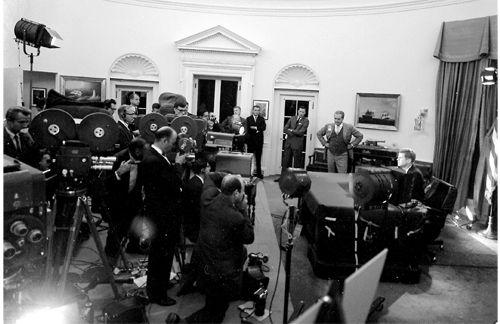
Cameramen film President Kennedy’s address to the nation, October 22, 1962, outlining his strategy for the removal of Soviet nuclear warheads in Cuba.
[JFK Presidential Library and Museum]
“Good evening, my fellow citizens,” he says in greeting from his study at the White House. There are deep grooves under his greenish-gray eyes, giving him a haggard look instead of the vibrant, youthful countenance the nation is used to seeing.
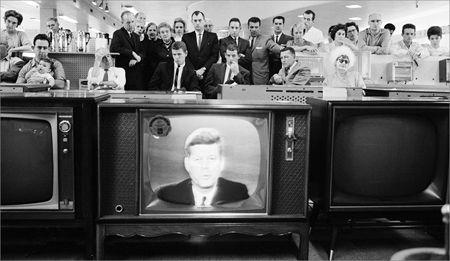
On October 22, 1962, customers in an electronics store watch President Kennedy’s address to the nation about the Cuban missile crisis.
[© Ralph Crane/Getty]
This broadcast from the White House is quite the opposite of Jackie’s lighthearted tour eight months earlier. Kennedy must make the most powerful speech of his life. He does not smile. His face is stern. There is menace in his eyes. He is not optimistic, nor even hopeful. His words come out angrily, with a vehemence that shocks some viewers. Kennedy speaks the words of a man who has been bent until he will bend no more. And now he’s fighting back.
“Within the past week, unmistakable evidence has established the fact that a series of offensive missile sites is now in preparation on that imprisoned island. The purpose of these bases can be none other than to provide a nuclear strike capability against the Western Hemisphere.”
Here the president pauses, letting the words sink in. He then talks about Soviet foreign minister Andrei Gromyko’s visit to his office the previous Thursday, quotes Gromyko on the subject of missiles in Cuba—and then calls Gromyko a liar, for all the world to hear.
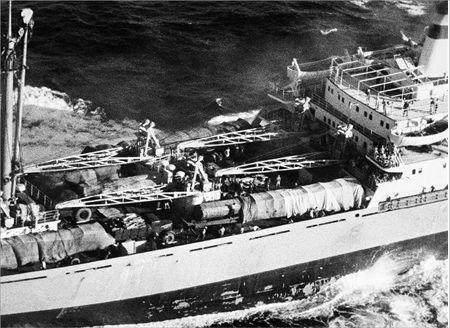
Soviet ship with missiles partially uncovered.
[© Bettmann/Corbis]
The president is about to throw down the gauntlet. “Acting, therefore, in the defense of our own security and of the entire Western Hemisphere, and under the authority entrusted me by the Constitution as endorsed by the resolution of the Congress, I have directed that the following initial steps be taken immediately.”
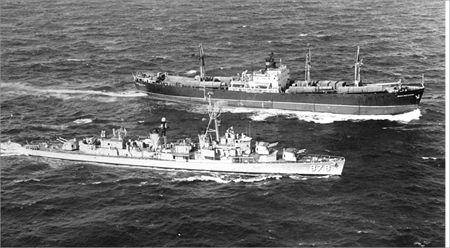
The U.S. destroyer
Vesole
escorts a Soviet ship returning to its home port, November 12, 1962.
[© Bettmann/Corbis]
JFK promises to “quarantine” Cuba, using the might of the U.S. Navy to prevent any Soviet vessel from entering Cuban waters. He declares that he is prepared to use military might in the form of an invasion, if necessary. He states unequivocally that any missile launched by the Cubans or Soviets will be considered an act of war and that the United States will reciprocate with missiles of its own. The president then places the blame squarely on the Soviets. “And finally, I call upon Chairman Khrushchev to halt and eliminate this clandestine, reckless, and provocative threat to world peace and stable relations between our two nations. I call upon him further to abandon this course of world domination and to join in an historic effort to end the perilous arms race and transform the history of man.”
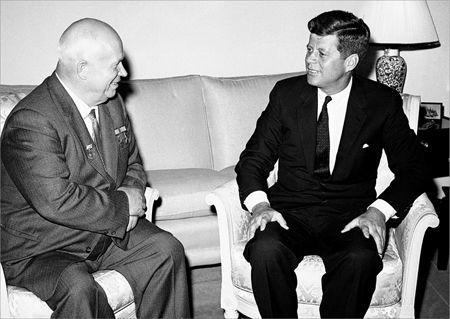
The year before the Cuban missile crisis, Khrushchev and Kennedy had a cordial meeting in Vienna, Austria.
[© Associated Press]
The power of the president’s speech, and the terrible news that he now delivers to the public, will make this moment stand forever in the minds of people watching. For as long as they live, men and women will recall where they were and what they were doing when they heard this terrible news.
John Kennedy, being his charismatic self, is incapable of concluding a speech without a stirring moment to galvanize his listeners. Whether with his Gold Star Mothers speech in a Boston American Legion hall during his first run for Congress, or with his inaugural address in 1961, or now on national television, JFK knows how to grab his listeners by the heart and rally their emotional support.
“Our goal is not the victory of might, but the vindication of right. Not peace at the expense of freedom, but both peace and freedom—here in this hemisphere and, we hope, around the world. God willing, that goal will be achieved.”
The White House set fades to black.
* * *